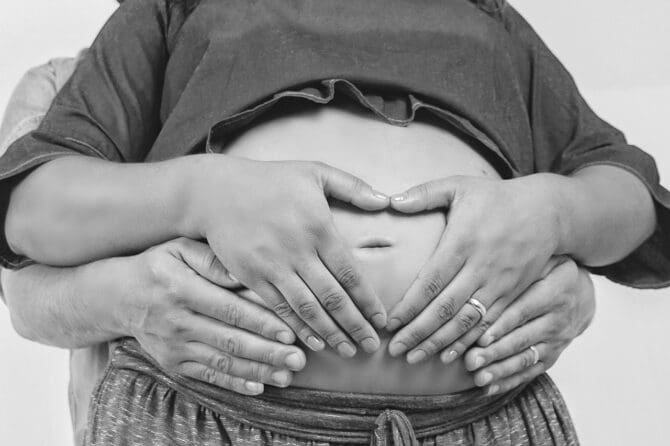Obesity and infertility are two interconnected health issues that have gained significant attention in recent years. This article aims to explore the potential link between obesity and infertility, shedding light on the impact of excess weight on fertility and reproductive health.
Obesity, defined as having a body mass index (BMI) of 30 or higher, has been found to have detrimental effects on both male and female fertility. In women, excess weight can disrupt hormonal balance, leading to irregular or absent ovulation. This hormonal imbalance can also contribute to the development of conditions such as polycystic ovary syndrome (PCOS), a common cause of infertility. Moreover, obesity increases the risk of complications during pregnancy, such as gestational diabetes and preeclampsia.
For men, obesity can negatively impact fertility by reducing sperm quality and quantity. Studies have shown that obese men often have lower sperm counts and decreased sperm motility, making it more difficult to achieve pregnancy. Additionally, hormonal imbalances caused by obesity can lead to erectile dysfunction, further hindering the ability to conceive.
It is important to note that the impact of obesity on fertility is not limited to physical factors alone. Psychological factors, such as low self-esteem and body image issues, can also contribute to sexual dysfunction and reduced fertility. Therefore, addressing obesity and its effects on fertility requires a holistic approach that considers both physical and mental well-being.
Managing obesity and improving fertility outcomes often involves adopting a healthy lifestyle. Regular exercise, such as brisk walking or swimming, can help maintain a healthy weight and improve reproductive health. A balanced diet, rich in fruits, vegetables, and lean proteins, provides essential nutrients for fertility. Weight loss, even as little as 5-10% of total body weight, has been shown to significantly increase the chances of conception.
Seeking medical advice and treatment options is crucial for individuals struggling with obesity and infertility. Healthcare professionals can provide personalized guidance and recommend interventions tailored to each individual’s needs. In some cases, fertility treatments such as assisted reproductive technologies may be necessary to overcome infertility challenges.
In conclusion, the connection between obesity and infertility is a complex and multifaceted issue. Excess weight can have a significant impact on both male and female fertility, affecting hormonal balance, ovulation, sperm quality, and sexual function. However, by adopting a healthy lifestyle and seeking appropriate medical care, individuals affected by obesity can improve their fertility outcomes and increase their chances of conceiving.
Impact of Obesity on Female Fertility
Excess weight can have significant implications for female fertility. When a woman is overweight or obese, it can disrupt the delicate hormonal balance in her body, leading to irregular menstrual cycles and affecting the regularity of ovulation. This disruption in ovulation can make it more difficult for women to conceive.
In addition to hormonal imbalances, obesity also increases the risk of developing conditions such as polycystic ovary syndrome (PCOS). PCOS is a hormonal disorder that affects the ovaries and can cause cysts to form. Women with PCOS often experience irregular periods, difficulty in ovulating, and may have difficulty getting pregnant.
Furthermore, obesity can also impact the effectiveness of fertility treatments. Research has shown that women with a higher body mass index (BMI) may have a reduced response to fertility medications and a lower success rate with procedures such as in vitro fertilization (IVF).
It is important for women who are struggling with infertility to address any weight issues they may have. By adopting a healthy lifestyle, including regular exercise and a balanced diet, women can not only improve their overall health but also increase their chances of conceiving. Losing weight can help regulate hormonal levels, enhance ovulation, and reduce the risk of conditions such as PCOS.
Seeking medical advice and treatment options is also crucial for women who are overweight or obese and experiencing fertility issues. A healthcare professional can provide guidance on the most appropriate weight loss strategies and may recommend additional interventions or fertility treatments to increase the likelihood of pregnancy.
Impact of Obesity on Male Fertility
Obesity in men can have significant effects on fertility and reproductive health. One of the key impacts is on sperm quality and quantity. Research has shown that obese men tend to have lower sperm counts and reduced sperm motility, making it more difficult for them to fertilize an egg. This can greatly decrease the chances of conception and increase the time it takes for a couple to achieve pregnancy.
In addition to affecting sperm, obesity can also cause hormonal imbalances in men. Adipose tissue, or fat cells, produce estrogen, which can disrupt the delicate balance of hormones in the male body. This imbalance can further impair fertility by interfering with the production of testosterone, the primary male sex hormone responsible for sperm production. Low testosterone levels can lead to a decrease in sperm production and quality.
Another consequence of obesity in men is erectile dysfunction. Excess weight can contribute to the development of conditions such as diabetes and high blood pressure, both of which are known to be risk factors for erectile dysfunction. Difficulties in achieving and maintaining an erection can obviously hinder the ability to conceive, as sexual intercourse is necessary for fertilization to occur.
All of these factors combined can have a negative impact on male fertility and the ability to conceive. It is important for men who are struggling with obesity and fertility issues to seek medical advice and explore treatment options. Adopting a healthier lifestyle, including regular exercise and a balanced diet, can help to improve fertility outcomes by promoting weight loss and hormone balance. In some cases, medical interventions such as hormone therapy or assisted reproductive techniques may be recommended to overcome fertility challenges associated with obesity.
Managing Obesity and Improving Fertility
Adopting a healthy lifestyle is crucial for individuals affected by obesity who are looking to improve their fertility. Making positive changes to one’s daily habits can have a significant impact on fertility outcomes for both men and women.
Regular exercise plays a vital role in managing obesity and promoting fertility. Engaging in physical activities not only helps in shedding excess weight but also improves overall cardiovascular health. It is recommended to incorporate a combination of aerobic exercises, such as brisk walking or swimming, and strength training exercises, such as weightlifting or yoga, into one’s routine. However, it is important to start gradually and consult a healthcare professional before beginning any exercise program.
A balanced diet is another essential component of managing obesity and improving fertility. Consuming a variety of nutrient-rich foods, such as fruits, vegetables, whole grains, lean proteins, and healthy fats, can support hormonal balance and reproductive health. It is advisable to limit the intake of processed foods, sugary beverages, and foods high in saturated fats. Additionally, maintaining a healthy weight through portion control and mindful eating can positively impact fertility.
Weight loss is often a necessary step for individuals struggling with obesity and fertility issues. Losing even a moderate amount of weight can enhance fertility outcomes. However, it is crucial to approach weight loss in a healthy and sustainable manner. Crash diets or extreme weight loss methods can disrupt hormonal balance and negatively affect reproductive health. Seeking guidance from a registered dietitian or healthcare professional can provide personalized advice and support throughout the weight loss journey.
While adopting a healthy lifestyle can significantly improve fertility outcomes, it is important to acknowledge that seeking medical advice and treatment options may also be necessary. In some cases, underlying medical conditions or infertility factors may require specialized interventions. Consulting with a reproductive endocrinologist or fertility specialist can help identify any underlying issues and provide appropriate treatment options, such as fertility medications, assisted reproductive technologies, or surgical interventions.
In conclusion, managing obesity and improving fertility go hand in hand. By adopting a healthy lifestyle, including regular exercise, a balanced diet, and weight loss, individuals affected by obesity can enhance their chances of conceiving. Seeking medical advice and treatment options when needed can further support fertility goals. Remember, making these positive changes not only benefits fertility but also contributes to overall well-being and quality of life.
Frequently Asked Questions
- 1. Can obesity affect a woman’s fertility?
Yes, excess weight can disrupt hormonal balance, affect ovulation, and increase the risk of conditions such as polycystic ovary syndrome (PCOS), all of which can contribute to infertility in women.
- 2. How does obesity impact male fertility?
Obesity in men can lead to reduced sperm quality and quantity, hormonal imbalances, and erectile dysfunction, all of which can negatively impact fertility and the ability to conceive.
- 3. Can losing weight improve fertility?
Yes, adopting a healthy lifestyle that includes regular exercise, a balanced diet, and weight loss can help improve fertility outcomes for both men and women affected by obesity.
- 4. Should I seek medical advice if I am struggling with obesity and infertility?
Yes, it is advisable to seek medical advice if you are facing challenges with both obesity and infertility. A healthcare professional can provide guidance, recommend appropriate treatments, and help you navigate your fertility journey.
- 5. Are there specific treatments available for obese individuals experiencing fertility issues?
There are various treatment options available for individuals struggling with both obesity and infertility. These may include lifestyle modifications, fertility medications, assisted reproductive technologies (ART), or bariatric surgery in some cases. Consulting with a fertility specialist is crucial to determine the most suitable treatment plan for your specific situation.
- 6. Can obesity-related fertility problems be completely reversed?
While every individual case is unique, adopting a healthy lifestyle and managing obesity can significantly improve fertility outcomes. However, it is important to note that complete reversal of fertility problems cannot be guaranteed in all cases.
- 7. Does obesity only affect natural conception or can it also impact fertility treatments?
Obesity can affect both natural conception and fertility treatments. Excess weight can reduce the success rates of fertility treatments such as in vitro fertilization (IVF) and increase the risk of complications during pregnancy.
- 8. Can losing weight increase the chances of a successful pregnancy?
Yes, weight loss can increase the chances of a successful pregnancy for individuals struggling with obesity. By improving overall health and addressing underlying fertility issues, weight loss can positively impact fertility outcomes.
- 9. How long does it take for weight loss to improve fertility?
The time it takes for weight loss to improve fertility can vary depending on individual circumstances. It is important to maintain a realistic expectation and work closely with healthcare professionals to monitor progress and adjust treatment plans accordingly.
- 10. Are there any specific exercises or diets recommended for improving fertility in obese individuals?
While there are no one-size-fits-all exercise or diet plans, engaging in regular physical activity and following a balanced, nutritious diet can be beneficial for improving fertility in obese individuals. Consulting with a healthcare professional or a registered dietitian can help create a personalized plan based on individual needs.











